The Department of Diplomacy and Foreign Policy of the Republic of Tajikistan was established by order of the Rector of Tajik National University on February 6, 2017. At various times, the role of acting head of the department was filled by Doctor of Political Science P.A. Muhammadzoda and Ph.D. in History A.N. Sharipov. Currently, the department is headed by Ph.D. in History, Associate Professor Farrukh Nasimovich Salimov, who actively fosters the department’s growth across educational, methodological, research, project, and other dimensions.
Academic Staff
The department’s faculty includes doctors and candidates of sciences with extensive academic and practical experience in diplomacy and international relations. Among the distinguished members are political science professors E.R. Rahmatullozoda and P.A. Muhammadzoda, Doctor of Philology Professor Sattorzoda, Ph.D. in History and Associate Professor S. Jafarov (Dean of the Faculty), senior lecturers including Ph.D. Anvari Safari (Deputy Dean for Science and International Relations) and Ph.D. Farzonai Shamsiddin, along with assistants – Fatona Gaforzoda, Shabnam Akobirshoeva, and Rahmon Narkabilov. The department’s lab assistant, Bibiomina Oyakhmadova, ensures essential technical and organizational support for the academic process.
Over the years, prominent scholars and educators have contributed to the department’s development and growth, leaving a lasting impact. These include Professor N.M. Mirzoev, Professor D.L. Latifov, Associate Professor A.N. Sharipov, Senior Lecturers M. Shahidi (Ph.D. in Philology) and Sh.Sh. Rizoyon (Ph.D. in political science), Assistant Nigina Jobirova, and lab assistants Dilovarsho Mahfirati, Gulniso Butaeva, and Adiba Toirova. Their professionalism and dedication have made an indelible mark on the department’s history.
To maintain a high standard of academic education and student preparation, the department invites experts from various government and academic institutions, enhancing students’ in-depth knowledge of international issues and diplomacy. Guest lecturers include Associate Professor H.D. Samiev (Head of Foreign Regional Studies department), Associate Professor A. Najmiddinov (Head of European Studies department), Professor Gulomzhon Mirzoev (former Deputy Minister of Foreign Affairs), Izzatullo Nurullozoda (Head of the Investment Activity Department of the State Committee on Investments and State Property Management of the Republic of Tajikistan), Colonel Z.N. Tagozoda (Deputy Head of International Military Cooperation at the Ministry of Defense of the RT), Maruf Abdurakhmonov (Deputy Head of the Asia and Africa Department of the MFA), Shohin Samadi (Head of the Press and Information Department of the MFA), Sharaf Rahimi (Head of Strategic Studies at the MFA), Hakim Ismoilzod (First Deputy Director of the Agency for Innovation and Digital Technologies), Merali Bodurshozoda (Deputy Director of the Agency for Innovation and Digital Technologies), among others. These specialists provide students with valuable practical knowledge and expertise in diplomacy.
Department Activities and Areas of Specialist Training
The department is focused on training competitive specialists for careers in diplomacy, foreign policy, and information-analytical fields. Students are educated with an awareness of the national interests of the Republic of Tajikistan, and are taught to understand, appreciate, and defend the cultural and social values of the Tajik people in the international arena.
Although relatively new, the department has achieved the status of a degree-conferring entity, training both bachelor’s and master’s students. In 2019, the department launched a master’s program in Foreign Policy and Diplomacy, followed in 2020 by the first cohort of bachelor’s students in the same field. In 2024, the department graduated its first class of bachelor’s students. Since 2022, the department has also implemented a bachelor’s program in Information-Analytical Activities in International Relations. These academic programs equip students with the skills of diplomacy, negotiation, and analytical thinking, as well as the ability to effectively represent Tajikistan on the global stage.
The department’s faculty delivers lecture courses for bachelor’s and master’s students in “International Relations” and “Regional Studies,” which helps students build a systematic understanding of diplomacy and analytical work. This enables graduates to acquire comprehensive knowledge and develop the essential skills required for fields such as political and diplomatic activities, analytics, international relations, and consulting. As a result, the department’s graduates are well-prepared to hold positions as advisors, translators, analysts, and consultants, including in government agencies, diplomatic missions, and international organizations.
Research and Academic Activities
The department conducts active research on key topics in foreign policy, diplomacy, and security. Faculty members are involved in the following research projects:
- Issues of Central Asian Stability: A study on security in Central Asia, focusing on the roles of internal and external actors, led by Associate Professor F.N. Salimov (2021–2025).
- The Islamic Republic of Iran in Central Asia’s Foreign Policy: Analysis of bilateral and multilateral cooperation between Central Asia and Iran, led by Professor D.L. Latifov (2021–2025).
- Foreign Policy and Security as Tajikistan’s Development Strategy: Examining Tajikistan’s foreign policy within the framework of a new international relations system, led by Professor P.A. Muhammadzoda (2021–2025).
- The Role of Central Asia in the New System of International Relations: Research on transit potential and regional integration, and the role of Tajikistan in these processes, led by Associate Professor A.N. Sharipov (2021–2025).
- Tajikistan’s Cooperation with UNESCO: Study of collaboration in science, education, and culture during the years of independence, led by Associate Professor S.K. Jafarov (2021–2025).
- Tajik-Afghan Relations in the Context of Modern Geopolitical Processes: An analysis of Tajik-Afghan relations, led by Senior Lecturer Farzonai Shamsiddin (2021–2025).
- Border Issues in Tajikistan’s Foreign Policy: Study of the historical and contemporary aspects of border formation and cross-border cooperation, led by Senior Lecturer Anvari Safari (2021–2025).
- Humanitarian Cooperation between Tajikistan and Central Asian Countries: An analysis of Tajikistan’s priorities in humanitarian diplomacy and regional cooperation prospects, led by research candidate Fatona Gaforzoda (2024–2025).
Research findings are published in articles and textbooks, and are applied in academic and scientific events.
Preparation of Scientific Personnel
The department places a strong emphasis on the training of scientific personnel, creating conditions for the growth and development of young researchers and scholars. A structured PhD training system is in place, along with support for young researchers working as independent candidates.
The PhD educational program in the specialty of “International Relations” (code 6D 020200) is designed for 3 years of full-time study. Graduates are awarded the degree of Doctor of Philosophy (PhD). The tuition fee is 8000 somoni (for international students — 16000 somoni).
Currently, the following PhD candidates are conducting scientific research on individually selected dissertation topics within the department: Qosim Gaffurov (3rd year), Sultonbakht Gulbekova, Nilufar Nurova, Mehrafzun Khudoyorova (2nd year), and Umedjon Ashurov (1st year). Additionally, Fatona Gaforzoda, Lutfullo Rukniddin, and Farzod Nurulloyev are actively engaged in research as independent candidates affiliated with the department.
Projects and International Collaboration
The department actively participates in international grants and research projects, collaborating with numerous academic institutions:
- Central Asian Border Issues Project (2024–2028) — led by F.N. Salimov, involving Professors E. Rahmatullozoda, M. Olimov, Sattorzoda, Associate Professors H. Samiev, S.K. Jafarov, A. Mamadazimova, and Ph.D. Anvari Safari.
- Protect to Prevent: A project focused on analyzing strategies for countering extremism in the Republic of Tajikistan (F. Salimov, Sh. Rizoyon).
- Media and Social Media Analysis Projects: Research on freedom of belief and violent extremism in Central Asia, including Kazakhstan, Tajikistan, and Uzbekistan (F. Salimov, Sh. Rizoyon).
- STRIVE Asia Program: A collaborative EU and UN initiative aimed at preventing violent extremism and supporting reintegration and rehabilitation efforts in Central Asia.
In addition, the department implements several national programs and studies, such as the “Public Awareness on Reintegration and Rehabilitation of Returnees” project in four target areas of Tajikistan, which received high praise from UNDP, and the “Capacity Building of National Stakeholders in PVE” program supported by Canada’s Ministry of Foreign Affairs.
Young Diplomats Club and TNU Expert-Analytical Center
The department hosts the Young Diplomats Club, led by Ph.D. Anvari Safari, where students can deepen their understanding of their field by discussing current topics in international politics and diplomacy. The club meets monthly.
The TNU Expert-Analytical Center operates within the department, aiming to prepare specialists in analytics and to conduct research on relevant issues in domestic and foreign policy. The center engages in scientific projects and provides consulting services to government structures.
Achievements of the Department
Since its foundation, the department has established itself as a leading unit of the faculty and university in methodological, scientific, research, and project activities. Key accomplishments include:
- Development of Educational Standards: The department has designed standards for the “Foreign Policy and Diplomacy” and “Information-Analytical Activities in International Relations” programs, used in national universities.
- Curriculum Creation: The department has developed syllabi and lecture programs that support high-quality specialist training.
- Assessment of Scientific Works: Faculty members actively assess doctoral and Ph.D. dissertations in international relations and foreign policy history.
- Lectures and Analytical Events: Faculty deliver lectures and training sessions for government agencies on topics such as national interests, extremism prevention, community cohesion, and youth employment.
- Participation in Certification Commissions: Faculty serve on certification boards for the Ministry of Education and Science of the RT.
- Sports and Charitable Initiatives: Faculty members participate in sports and charitable events to support youth initiatives.
- International Projects and Cooperation: The department has established partnerships with universities in the UK, Azerbaijan, Uzbekistan, Kazakhstan, Turkmenistan, Russia, China, and others.
- Analytical Work: Faculty develop policy briefs and recommendations on critical domestic and foreign policy issues for government agencies.
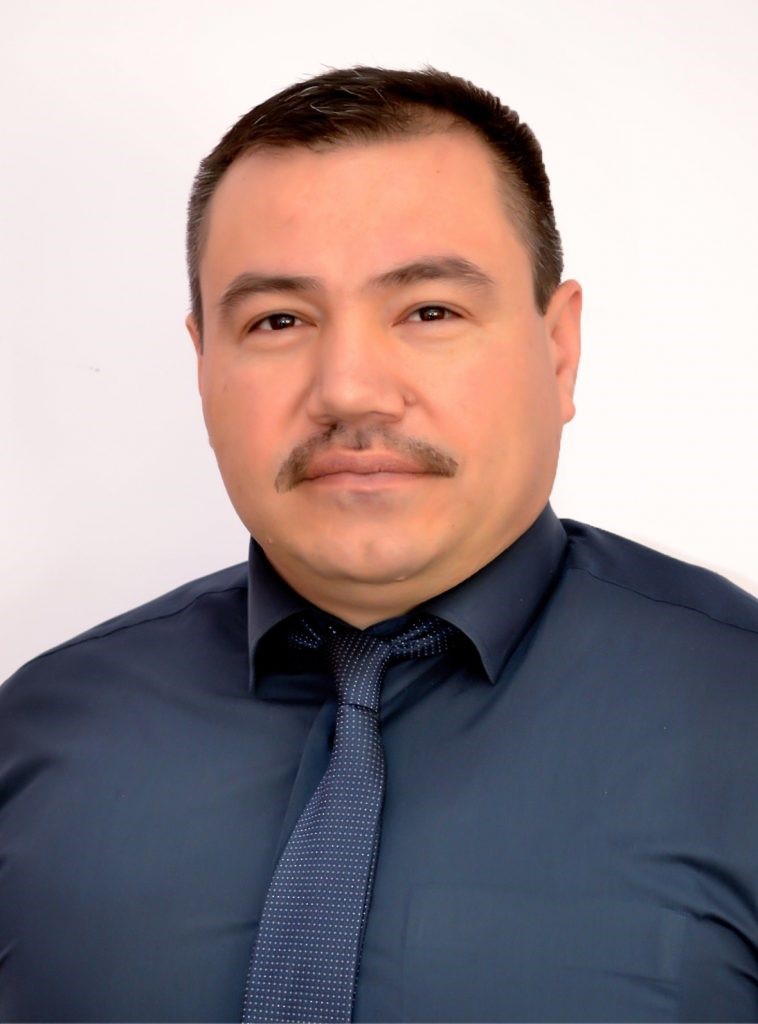
Salimov Farrukh Nasimovich
Born on February 12, 1981, in Dushanbe, Republic of Tajikistan. In 1997, he entered the History Faculty of Tajik National University, majoring in International Relations, and graduated with honors. In 2003, he completed a program in Peace and Conflict Resolution Studies at the United Nations’ Central European University. In 2015, he graduated from the Russian-Tajik (Slavonic) University with a degree in Management from the Faculty of Economics.
Salimov began his professional career at TNU as an assistant in the Department of International Relations. From 2004 to 2009, he chaired the Council of Young Scientists and served as Secretary of the Academic Council of the Faculty of History. From 2009 to 2012, he worked as Deputy Dean for Science. With the establishment of the Faculty of International Relations, he assumed the role of Deputy Dean for Science and International Relations. In April 2018, he was appointed Head of the Department of Diplomacy and Foreign Policy of the Republic of Tajikistan.
In 2017, Salimov defended his candidate dissertation in the field of International Relations and Foreign Policy History and was awarded the degree of Candidate of Historical Sciences by the Higher Attestation Commission (HAC) of the Russian Federation. In 2024, the Higher Attestation Commission under the President of the Republic of Tajikistan awarded him the academic title of Associate Professor.
Salimov’s academic work includes over 100 publications, comprising 4 textbooks, 8 methodological guidelines, 25 teaching programs, and more than 60 scientific and journalistic articles. Since 2006, he has been a member of the International Academic Forum on International Relations, an expert with the Institute of Political Solutions and the Eurasian Center for Political Research (since 2012), a member of the International Eurasian Research Council (since 2017), and since 2019, a participant in the Regional Advisory Group on Countering Violent Extremism.
In addition to his primary responsibilities, Salimov has taught in the Department of Humanities at the Military Institute of the Ministry of Defense of the Republic of Tajikistan, served as General Director of the international company KNAUF in Tajikistan, and currently leads the TNU Expert-Analytical Center. In 2019, he founded and became director of the public organization “Tahleel.”
Salimov has received numerous commendations and letters of gratitude from Tajik National University, the Tajik Technical University named after Academician M. Osimi, the Committee for Youth and Sports Affairs of Dushanbe, and other organizations. He has also completed training in various programs, including “Finance for Non-Financial Professionals,” “Personal Contribution as a Determining Factor of Results,” “Management by Measurement: Decision-Making, Planning, and Control,” “Accounting,” and a program in Conflict Analysis and Peacebuilding (UPEACE UN, Hungary). He is a two-time laureate of the International Relations Academic Forum, as well as the winner of the “Entrepreneur of the Year 2011” and “50 Stylish People of Dushanbe” contests.
Salimov is a member of the Union of Journalists and the Union of Architects of the Republic of Tajikistan. He holds the honorary titles “Excellence in Education and Science of the Republic of Tajikistan” and “Excellence in Journalism of the Republic of Tajikistan” (both awarded in 2019).
He has made research and professional visits to Kazakhstan, Kyrgyzstan, Uzbekistan, Turkmenistan, Russia, Georgia, Ukraine, Turkey, Germany, Austria, Hungary, Serbia, Kosovo, Latvia, and Vietnam.
Erkinhon Rakhmatullozoda (Erkin Rakhmatullaev)
Born on May 10, 1953, in Isfara, Sughd Province, Republic of Tajikistan. In 1974, he graduated with honors from the Arabic-English department of the Faculty of Oriental Languages at Lenin Tajik State University (now Tajik National University). In 1988, he completed an advanced training program for executive staff at the Diplomatic Academy of the USSR Ministry of Foreign Affairs. In 1999, he defended his dissertation on “The Role of the United Nations in Resolving the Inter-Tajik Conflict” at Lomonosov Moscow State University, earning a Candidate of Political Science degree. In 2008, he defended his doctoral dissertation titled “Preventive Diplomacy: Theory, Practice, and its Prospects in Central Asia” at the Diplomatic Academy of the Ministry of Foreign Affairs of the Russian Federation, receiving a Doctor of Political Science degree.
Since 2023, he has served as a professor in the Department of Diplomacy and Foreign Policy of the Republic of Tajikistan at the Faculty of International Relations, Tajik National University. He is also a member of the editorial board of the journal Foreign Policy, published by the Ministry of Foreign Affairs of the Republic of Tajikistan.
Author of six books and about 50 scientific articles, published in Tajikistan, Russia, the UAE, the Kingdom of Morocco, the Kingdom of Belgium, the United States, and Costa Rica. His book Preventive Diplomacy: Panacea or Mirage is used as a textbook at Lomonosov Moscow State University, while United Nations Peacekeeping and Preventive Diplomacy: Central Asia, Tajikistan, and Afghanistan is taught at the United Nations University for Peace in Costa Rica.
Rakhmatullozoda began his career in 1975 as an English teacher in the secondary schools of the Isfara district. From 1977 to 1980, he worked in the Arab Republic of Egypt, first as an Arabic translator for a team of Soviet specialists and later as a translator-referent at the USSR Embassy in Egypt.
From 1980 to 1986, he held senior positions within the Council of Ministers of the Tajik SSR. In 1986, he was appointed Chief Advisor (Deputy Minister) of the Ministry of Foreign Affairs of the Tajik SSR, and in 1992, he became the First Deputy Minister of Foreign Affairs of the Republic of Tajikistan. In 2001, he was appointed State Advisor to the President of the Republic of Tajikistan on Foreign Policy. In 2016, he was appointed Ambassador Extraordinary and Plenipotentiary of the Republic of Tajikistan to the Kingdom of Belgium, the Kingdom of the Netherlands, and the Grand Duchy of Luxembourg, as well as Permanent Representative of the Republic of Tajikistan to the European Union and NATO. In 1994, he became the second diplomat in the country to receive the diplomatic rank of Ambassador Extraordinary and Plenipotentiary of the Republic of Tajikistan. In 2004, he was awarded the highest professional rank of State Advisor of Tajikistan.
He has been honored with numerous awards, including the Order of “Sharaf” (Honor) First Class from the Republic of Tajikistan, the Order of “Le Mérite” (Merit) from the French Republic, the medal “From the Grateful Afghan People” from the Democratic Republic of Afghanistan, jubilee medals marking the 20th and 30th anniversaries of Tajikistan’s independence, the SCO Jubilee Medal, the CSTO Jubilee Medal, and two gold medals from the Islamic Organization for Culture, Science, and Education, among other medals and honors.
Married with five children.
Abdunabi Sattorzoda
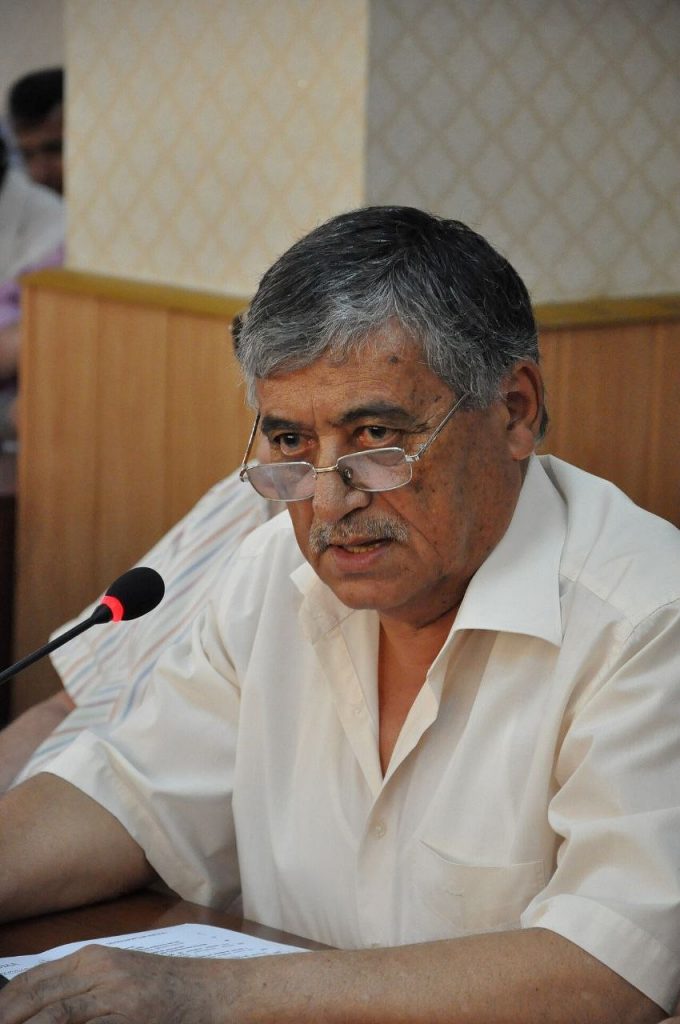
Born on February 27, 1941, in Varzikanda village of Panjakent district, Sughd region of the Republic of Tajikistan. Graduated from Tajik State (now National) University. Holds a Doctorate in Philology, is a professor, and an academician of the Academy of Persian Language and Literature (Iran). A member of the Union of Writers of Tajikistan, he also serves on the board and plenary council of the Union of Writers of Tajikistan, is the Chairman of the Abuabdulloh Roudaki Foundation, a member of the Scientific Supervisory Council of the National Encyclopedia of Tajikistan, and participates in the dissertation councils of the Rudaki Institute of Language and Literature and the Institute of Social Sciences named after Academician B. Iskandarov at the National Academy of Sciences of Tajikistan. He is a member of the editorial boards of scientific and literary journals, including “Sukhanshinosi” and “Sadoi Sharq” (Dushanbe), “Kamoli Khujandi” (Khujand), “Bulletin of the Institute of Social Sciences named after B. Iskandarov” (Khorog), and “Iran-Nameh” (Almaty, Kazakhstan).
Abdunabi Sattorzoda began his career in 1963 at Tajik State University, where he worked as a laboratory assistant, graduate student, instructor, senior lecturer, associate professor, and later as head of the Department of Classical Tajik Literature in the Faculty of Philology.
He was the head of the Literary Criticism Department of the “Sadoi Sharq” (Voice of the East) magazine, an official publication of the Union of Writers of Tajikistan (1967–1968), served as a commander of an Interior Ministry military unit in the former Soviet Union (1969–1971), was a doctoral candidate at Moscow State University (1979–1980), and worked as a professor at Kabul University (1985–1987) in Afghanistan.
From 1993 to 1999, he participated in the Inter-Tajik peace negotiations, working with the Joint Commission for Ceasefire Compliance and the Commission for National Reconciliation.
On March 17, 1999, Sattorov was appointed by decree of the President fo RT as Deputy Minister of Foreign Affairs of the Republic of Tajikistan, and served in this position until January 30, 2006. He holds the diplomatic rank of First-Class Envoy Extraordinary and Plenipotentiary.
From April 1st, 2006 to May 14, 2012 he headed the Department of Foreign Policy and Foreign Economic Relations at the Center for Strategic Studies under the President of the Republic of Tajikistan. From May 2006 to June 2023, he led the Literature History Department at the Rudaki Institute of Language and Literature, National Academy of Sciences of Tajikistan.
Abdunabi Sattoroda is the author of 25 books and over 500 scientific and literary articles addressing topics in classical, medieval, and modern literature in Persian (Dari and Tajik), as well as literary theory, poetics, literary criticism, and issues of culture, religion, and foreign policy. His works have been published in Tajikistan, Iran, Afghanistan, Russia, the United States, Japan, Sweden, Germany, the United Kingdom, India, South Korea, China, Kazakhstan, Kyrgyzstan, Azerbaijan, Armenia, Ukraine, Uzbekistan, Pakistan, and other countries, in Tajik, Russian, English, Chinese, Japanese, Persian, Dari, Pashto, German, Kazakh, Uzbek, and other languages.
His notable works on foreign policy include “Modern Tajik Diplomacy” (co-authored with Academician T. Nazarov; Dushanbe, 2006; Kabul, 2013), “Parliamentary Diplomacy and Foreign Policy of the Republic of Tajikistan” (co-authored with M. Sultonov; Dushanbe, 2010), and “Current Issues in the Foreign Policy of Tajikistan (Multivector Policy in Action)” (Dushanbe, 2014; 2024), among others.
Awards and Achievements:
- Order of “Sharaf” (Honor) in 1999 by the Presidential decree of the Republic of Tajikistan.
- Medal of “Nishoni Sukhan” from the Union of Writers of Tajikistan in 2004.
- Sadriddin Ayni Literary Prize for the book “Kuhna va Nav” (Old and New) in 2005.
- Medal commemorating the “20th Anniversary of Tajikistan’s Independence” in 2011.
- Awarded “Best Textbook” for the textbook “Tajik Literature” (for 8th grade) at the International Book Fair in Dushanbe in 2015.
- Title “Excellence in Culture of the Republic of Tajikistan” in 2019.
- Muhammad Osimi Prize from the National Academy of Sciences of Tajikistan for the monograph “The Literary Views of Abdurrahman Jami” in 2020.
- “20th Anniversary of the Shanghai Cooperation Organization” Commemorative Medal in 2021.
- Medal of “Nishoni Iftikhor” from the Union of Writers of Tajikistan in 2024.
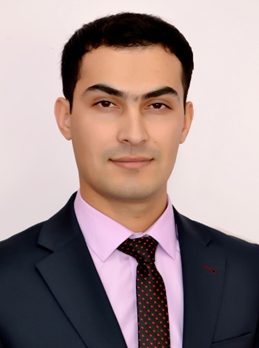
Senior lecturer of the department
Tel.: +992 918 97 31 81
E-mail: anvari.safar@mail.ru
Address: Sino region, st. Mayakovsky 70/2
SPIN code: 4198-3152
ANVARI Safari
c.h.s., senior lecturer
Was born on January 23, 1993 in Kulob city. In 1999 went to the first grade of secondary school №8 in Kulob city named after Fayzullo Tavakalov. After graduating from school in 2010, entered to the Kulob State University named after A. Rudaki at the Faculty of International Relations, from which graduated in 2015 with honors and received a higher specialty in international relations, translator, and referent. From 2016 to 2019 years, he was a postgraduate student at the correspondence department of the Department of Foreign Regional Studies and was engaged in research activities on the topic “Border issues in the foreign policy of the Republic of Tajikistan”.
From 2017 to the present, a teacher at the Department of Diplomacy and Foreign Policy of the Republic of Tajikistan. From 2018 to 2019 years, held the position of adviser in the specialty of information and analytical activities in IR, from 2019 to 2024 years, held the position of secretary of the Faculty Academic Council and from 2022 to the present, he was appointed deputy dean for science and innovation of the Faculty of International Relations TNU.
In 2021 defended his dissertation on the topic “Border issues in the foreign policy of the Republic of Tajikistan” in the specialty 07.00.15 – History of international relations and foreign policy (historical sciences). Author of 18 scientific articles, 3 educational programs and 1 monograph.
Shabnam Akobirshoeva
Assistant Professor of the
Department
Phone: +992888772299
Email: shabikakobirshoeva@gmail.com
Shabnam Akobirshoeva was born on April 18, 1995, in Dushanbe, Tajikistan, in a family of educators. She completed her secondary education at School No. 90 in the Sino district of Dushanbe. From a young age, she showed a strong interest in foreign languages, leading her to enroll in the Faculty of Foreign Languages at Sadriddin Ayni Tajik State Pedagogical University in 2013. She graduated in 2017 with a bachelor’s degree in English philology.
In 2015, she attended the Summer School of Women’s Leadership at Green River Community College in Washington, USA, through the SUSI program.
In 2017, she entered the master’s program at the Faculty of International Relations at Tajik National University in the “European Studies” program (TACES+), specializing in Regional Studies. As part of her studies, she participated in a student exchange program supported by ERASMUS+, spending a semester at the Johan Skytte Institute of Political Studies in Tartu, Estonia. She completed her master’s degree in 2019 and worked on the Access Micro-Scholarship Program, implementing inclusive educational programs for children with the support of the U.S. Embassy in Tajikistan.
Since 2020, she has been pursuing her PhD at the Faculty of International Relations at Tajik National University and teaching at the Department of Diplomacy and Foreign Policy. Her research focuses on the topic “Scientific and Cultural Relations of the EU with Tajikistan within the New Strategy (2014-2020).”
She actively participates in international conferences and symposiums, presenting her research in the USA, Estonia, Russia, Kazakhstan, and Kyrgyzstan.
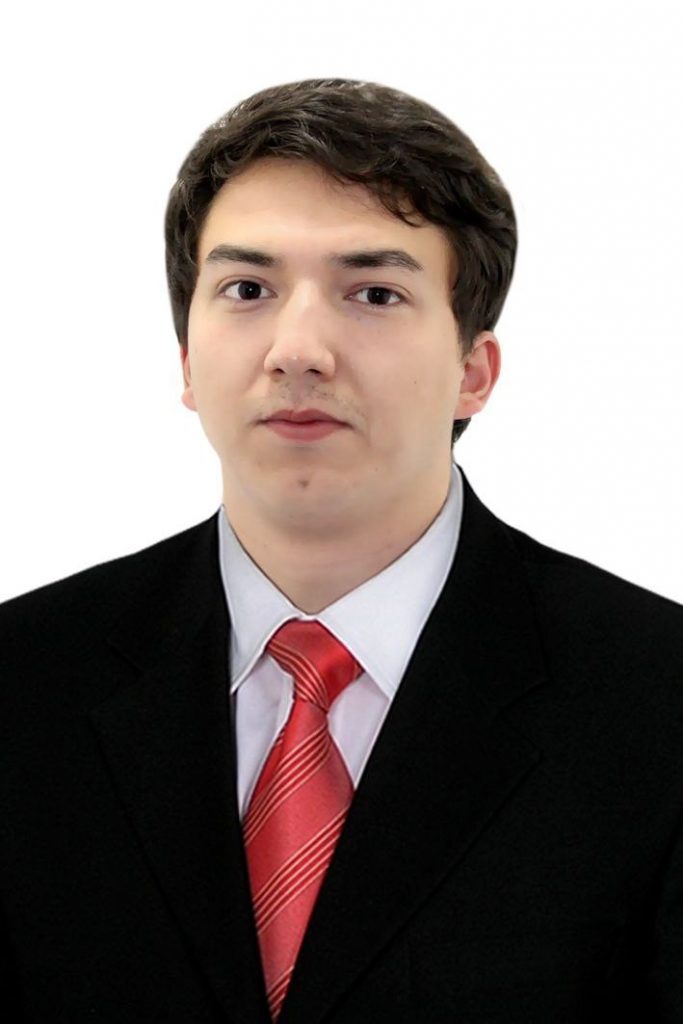
Rahmon Narkabilov
Department Assistant
E-mail: rahmonnarkabilov@gmail.com
Phone: (+992 880 185 885)
Address: TNU, Student Campus, Building №11
Rahmon Narkabilov was born on November 12, 2000, in Dushanbe. In 2018, he graduated from the high school affiliated with Moscow State University’s branch in Dushanbe and entered the Faculty of International Relations at Tajik National University in the same year. In 2022, he successfully completed his studies, earning qualifications as an international relations specialist and a reference translator, demonstrating both a high level of academic achievement and a keen research interest in diplomacy and international analytics.
From 2022 to 2024, he pursued a master’s degree in the “Foreign Policy and Diplomacy” program within the Department of Diplomacy and Foreign Policy of the Republic of Tajikistan. During his master’s studies, Narkabilov actively engaged in research activities, focusing on predictive and analytical methods in international relations. His dissertation on “Forecasting and Analytical Activity in International Relations” was highly rated, and the findings were published in several academic journals, including:
- Narkabilov R. (co-author). Issues and Prospects of Forecasting and Analytical Activity in Modern International Relations // “Young Researcher” Scientific Journal. Dushanbe: DMT, 2024, №6, pp. 246–250.
- Narkabilov R. (co-author). The Role and Position of Analytical Centers in the System of International Relations (Case Study of the Republic of Tajikistan) // “Young Researcher” Scientific Journal. Dushanbe: DMT, 2024, №6, pp. 216–220.
His works address critical issues regarding the role of analytical centers in shaping international policy and emphasize the importance of analytical practices in modern Tajikistan’s diplomacy. Narkabilov is committed to integrating analytical approaches for evaluating and forecasting international processes, making him a sought-after young expert in the field of diplomatic analytics.
Since 2024, Rahmon Narkabilov has been working as an assistant at the Department of Diplomacy and Foreign Policy of the Republic of Tajikistan, Faculty of International Relations at Tajik National University. In this role, he actively contributes to the department’s academic and research activities, conducting seminar sessions and continuing his research initiatives.
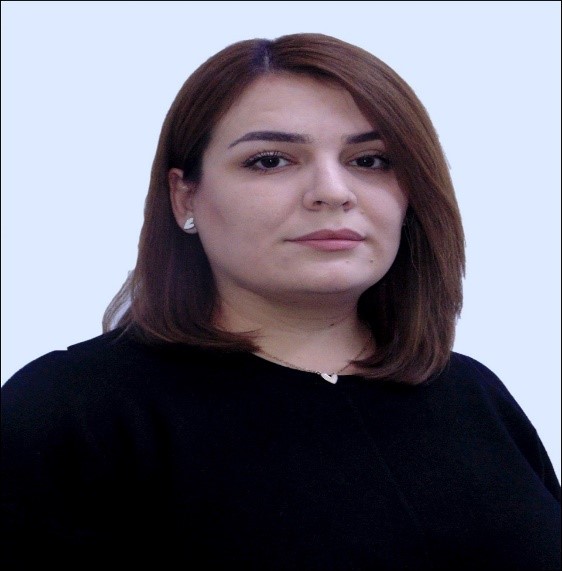
Shabnam Akobirshoeva
Assistant Professor of the
Department
Phone: +992888772299
Email: shabikakobirshoeva@gmail.com
Shabnam Akobirshoeva was born on April 18, 1995, in Dushanbe, Tajikistan, in a family of educators. She completed her secondary education at School No. 90 in the Sino district of Dushanbe. From a young age, she showed a strong interest in foreign languages, leading her to enroll in the Faculty of Foreign Languages at Sadriddin Ayni Tajik State Pedagogical University in 2013. She graduated in 2017 with a bachelor’s degree in English philology.
In 2015, she attended the Summer School of Women’s Leadership at Green River Community College in Washington, USA, through the SUSI program.
In 2017, she entered the master’s program at the Faculty of International Relations at Tajik National University in the “European Studies” program (TACES+), specializing in Regional Studies. As part of her studies, she participated in a student exchange program supported by ERASMUS+, spending a semester at the Johan Skytte Institute of Political Studies in Tartu, Estonia. She completed her master’s degree in 2019 and worked on the Access Micro-Scholarship Program, implementing inclusive educational programs for children with the support of the U.S. Embassy in Tajikistan.
Since 2020, she has been pursuing her PhD at the Faculty of International Relations at Tajik National University and teaching at the Department of Diplomacy and Foreign Policy. Her research focuses on the topic “Scientific and Cultural Relations of the EU with Tajikistan within the New Strategy (2014-2020).”
She actively participates in international conferences and symposiums, presenting her research in the USA, Estonia, Russia, Kazakhstan, and Kyrgyzstan.
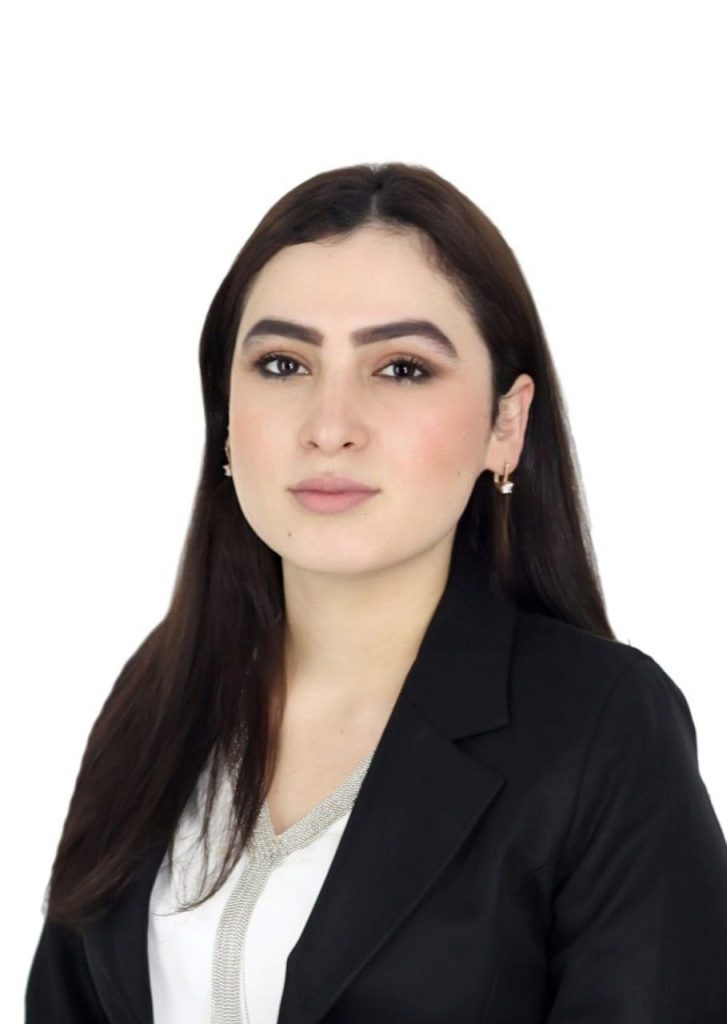
Ghaforzoda Fatona Jamshed
Assistant of the department
E-mail: fatona_5796@mail.ru
SPIN-code: 5363-6908
GHAFORZODA Fatona Jamshed
assistant
Born on July 5, 1996, in Farkhor District, Khatlon Region, Republic of Tajikistan. In 2014, she enrolled at the Faculty of International Relations of Tajik National University, graduating in 2019 with a degree in “International Relations, Referent-Translator.”
From 2019 to 2020, she held the position of laboratory assistant at the Department of Diplomacy and Foreign Policy of the Republic of Tajikistan. From 2020 to 2021, she worked as an advisor in the specialty “Information and Analytical Activities in International Relations.” Concurrently, from 2019 to 2022, she served as Chairwoman of the Women’s Council of the Faculty of International Relations. Since 2021, she has been a lecturer at the Department of Diplomacy and Foreign Policy of the Republic of Tajikistan.
Since 2021, she has been a postgraduate researcher at the Department of Diplomacy and Foreign Policy of the Republic of Tajikistan, conducting research on the topic “Humanitarian Cooperation between the Republic of Tajikistan and Central Asian States in the Context of the New Foreign Policy Concept (2015–2021).”
She has published three scientific articles and five theses on the topic of her research and has presented at national and university conferences.
She teaches the following disciplines: “Cultural Diplomacy,” “Fundamentals of Military Diplomacy,” “History and Theory of Diplomacy,” “Information Support of Foreign Policy,” “Diplomatic Service of Foreign Countries,” and “Current Issues of the Foreign Policy of the Republic of Tajikistan.”
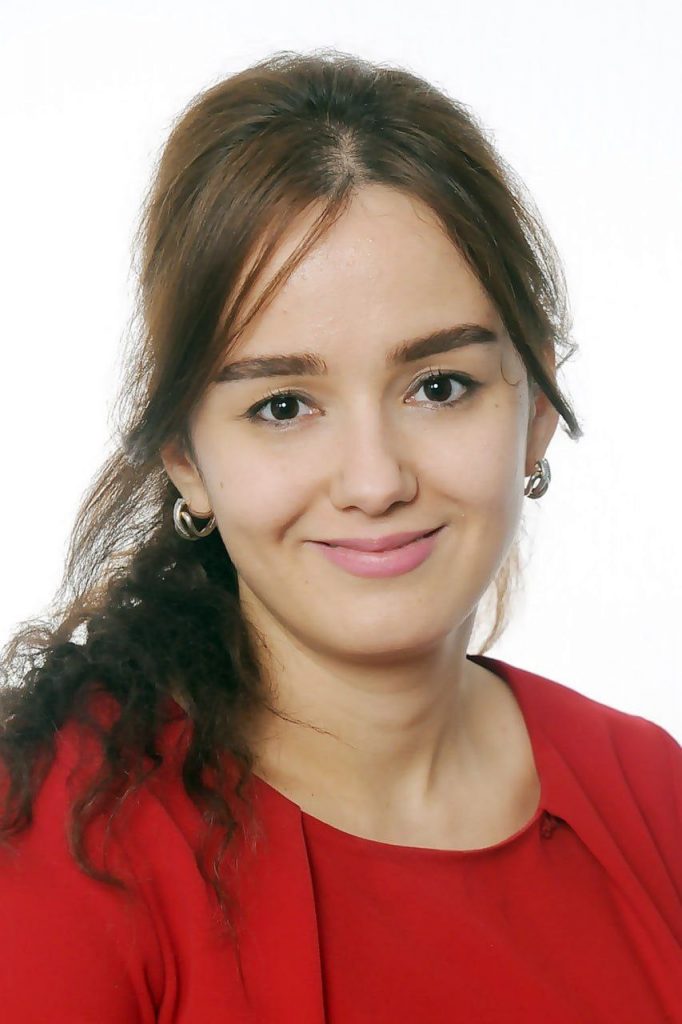
FARZONAI SHAMSIDDIN
Candidate of Historical Sciences, senior lecturer
Tel.: +992 918 722532
E-mail: Fairy-f@mail.ru
Address: Bofanda 3, apartment 28.
Farzonai Shamsiddin was born on April 29, 1990 in the city of Dushanbe in a family of intellectuals. After graduating from secondary school in 2007, she entered the Faculty of History and International Relations of the Russian-Tajik Slavonic University, from which she graduated with honors in International Relations in 2012. In 2013, she entered the full-time postgraduate department of the Tajik National University, where she defended her PhD thesis on “Tajik-Afghan relations in the context of modern geopolitical processes in Central Asia.”
In 2016, she was hired as an assistant at the Department of International Relations, and since 2019, she has been working at the Department of Diplomacy and Foreign Policy of the Republic of Tajikistan.
In 2023, she was awarded the degree of Candidate of Historical Sciences in the specialty 5.6.7-History of International Relations and Foreign Policy.
Farzonai Shamsiddin teaches subjects such as diplomatic protocol and ceremonial, diplomatic and consular service, diplomatic service of foreign countries and the history of Tajik diplomacy for Russian and English groups. She is also responsible for the graduation papers (term papers) of students specializing in international relations and information and analytical work.
Farzonai Shamsiddin regularly makes presentations at university, national and international conferences on topical issues of international relations. Farzonai Shamsiddin is the author of a number of scientific and journalistic reports, including 8 scientific articles published in peer-reviewed journals.
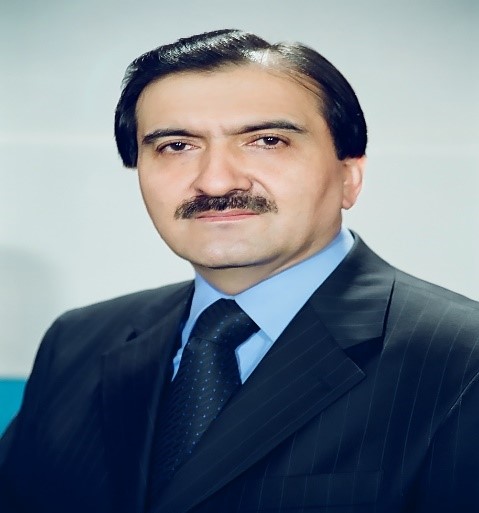
Erkinhon Rakhmatullozoda (Erkin Rakhmatullaev)
Born on May 10, 1953, in Isfara, Sughd Province, Republic of Tajikistan. In 1974, he graduated with honors from the Arabic-English department of the Faculty of Oriental Languages at Lenin Tajik State University (now Tajik National University). In 1988, he completed an advanced training program for executive staff at the Diplomatic Academy of the USSR Ministry of Foreign Affairs. In 1999, he defended his dissertation on “The Role of the United Nations in Resolving the Inter-Tajik Conflict” at Lomonosov Moscow State University, earning a Candidate of Political Science degree. In 2008, he defended his doctoral dissertation titled “Preventive Diplomacy: Theory, Practice, and its Prospects in Central Asia” at the Diplomatic Academy of the Ministry of Foreign Affairs of the Russian Federation, receiving a Doctor of Political Science degree.
Since 2023, he has served as a professor in the Department of Diplomacy and Foreign Policy of the Republic of Tajikistan at the Faculty of International Relations, Tajik National University. He is also a member of the editorial board of the journal Foreign Policy, published by the Ministry of Foreign Affairs of the Republic of Tajikistan.
Author of six books and about 50 scientific articles, published in Tajikistan, Russia, the UAE, the Kingdom of Morocco, the Kingdom of Belgium, the United States, and Costa Rica. His book Preventive Diplomacy: Panacea or Mirage is used as a textbook at Lomonosov Moscow State University, while United Nations Peacekeeping and Preventive Diplomacy: Central Asia, Tajikistan, and Afghanistan is taught at the United Nations University for Peace in Costa Rica.
Rakhmatullozoda began his career in 1975 as an English teacher in the secondary schools of the Isfara district. From 1977 to 1980, he worked in the Arab Republic of Egypt, first as an Arabic translator for a team of Soviet specialists and later as a translator-referent at the USSR Embassy in Egypt.
From 1980 to 1986, he held senior positions within the Council of Ministers of the Tajik SSR. In 1986, he was appointed Chief Advisor (Deputy Minister) of the Ministry of Foreign Affairs of the Tajik SSR, and in 1992, he became the First Deputy Minister of Foreign Affairs of the Republic of Tajikistan. In 2001, he was appointed State Advisor to the President of the Republic of Tajikistan on Foreign Policy. In 2016, he was appointed Ambassador Extraordinary and Plenipotentiary of the Republic of Tajikistan to the Kingdom of Belgium, the Kingdom of the Netherlands, and the Grand Duchy of Luxembourg, as well as Permanent Representative of the Republic of Tajikistan to the European Union and NATO. In 1994, he became the second diplomat in the country to receive the diplomatic rank of Ambassador Extraordinary and Plenipotentiary of the Republic of Tajikistan. In 2004, he was awarded the highest professional rank of State Advisor of Tajikistan.
He has been honored with numerous awards, including the Order of “Sharaf” (Honor) First Class from the Republic of Tajikistan, the Order of “Le Mérite” (Merit) from the French Republic, the medal “From the Grateful Afghan People” from the Democratic Republic of Afghanistan, jubilee medals marking the 20th and 30th anniversaries of Tajikistan’s independence, the SCO Jubilee Medal, the CSTO Jubilee Medal, and two gold medals from the Islamic Organization for Culture, Science, and Education, among other medals and honors.
Married with five children.

